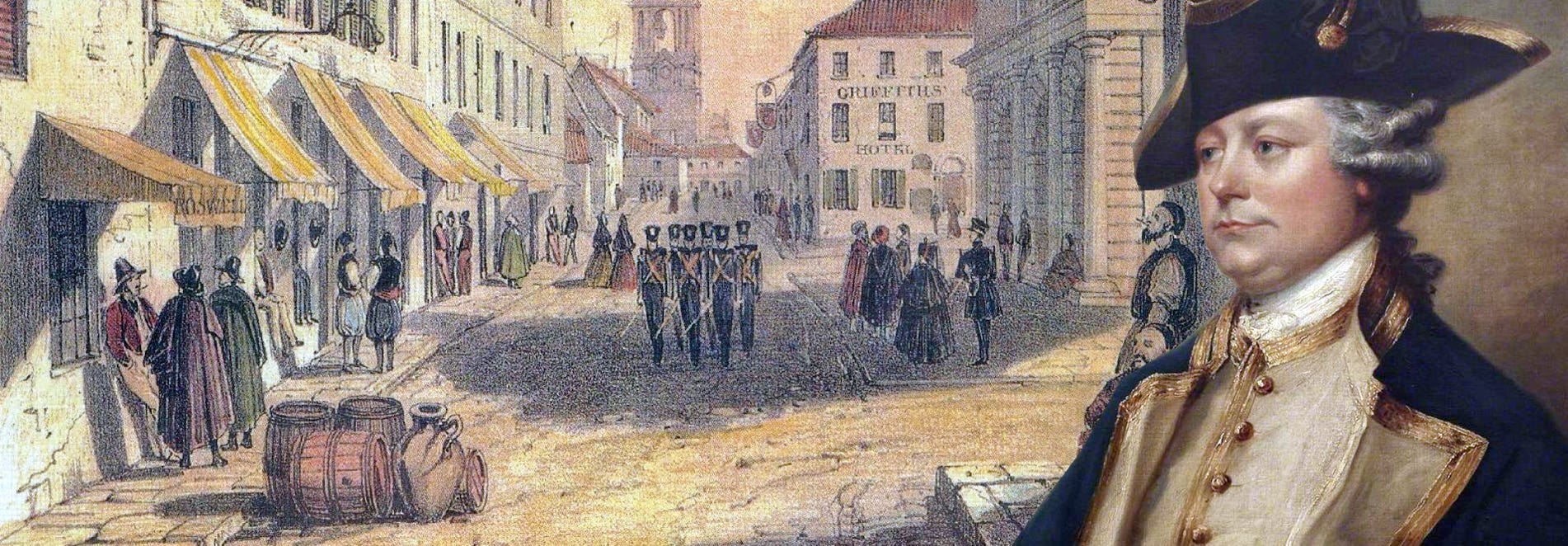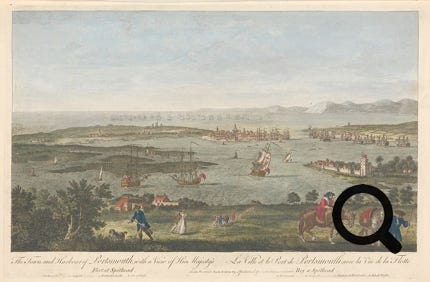
Henry Blanckley fleeing a duel
The story of 27 year old Henry Blanckley’s flight from an aristocratic bully, Augustus Hervey (pictured right) is featured in a 2010 book, entitled A Polite Exchange of Bullets. Although the account is drawn from Hervey’s own diary entries, Hervey clearly comes across as a bully.
The fleeing clerk is named only “Blankley” by Hervey in his journal, but we can be sure he was Henry Blanckley (baptised in Portsea in 1720) because his known movements and employment history fit exactly.
Extract from:
A Polite Exchange of Bullets: The Duel and the English Gentleman, 1750-1850
By Stephen Banks (2010)
It is not always easy to disentangle the desire to eradicate a stain from simple vindictiveness. Sometimes a sense of offence or indeed of malice was maintained over a prolonged period, and men did not seem abashed to declare that this was so. To illustrate, when a naval captain, Augustus Hervey, chose to record in his diary an affront given to him in 1747 he did so in such terms as to suggest that his own capacity to maintain a sense of grievance for years afterwards was evidence of his high honour. The circumstances in brief were that while his ship was in a Portsmouth dockyard one of the dockyard clerks, Mr Blankely, had, allegedly, been insolent to him. Hervey had threatened to beat him, “yet he never took any notice of it.” As a putative gentleman, the clerk had obviously mulled the matter over however, for some three days later he had turned up drunk at Hervey’s lodgings. Blankley had declared that he had been ill-used and had demanded satisfaction. Hervey had responded that he would receive it in the morning whereupon the drunken man had aimed an ineffectual blow with his stick. Hervey had given the man a very good drubbing in return. The following day he had gone to the man’s house to give satisfaction only to discover that the man had fled. Hervey had then responded by blackening the clerk’s name in the dockyard and writing to the commander of the local regiment to spread the news of the man’s cowardice.
One might suppose that having beaten and socially humiliated the clerk that would have sufficed; not so. For five and a half years thereafter, military service kept Hervey away from England. However, he followed the fortunes of Mr Blanker and heard that he had been posted to Gibraltar. In October 1752 Hervey’s ship berthed there:
Having long resolved wherever I met Mr Blankley to call him to account for his behaviour at Portsmouth I desired Captain Morgan, a friend of mine, and an officer of the garrison, to go to that fellow and tell that I desired he would immediately give me satisfaction for his conduct and that we must meet with sword and pistol on neutral ground. He send word by Captain Morgan he desired to ask my pardon publickly in any manner I pleased, upon which Captain Morgan and Lord Robert Manners, whom I had sent to, told me surely it was sufficient, let his offence have been what it would. And so he came with his friend, and asked me pardon before these gentlemen, all in humblest manner.
Hervey’s account is a healthy corrective to those unduly attracted to the values of honour, for it provides us with a rare insight into the condition of those persons who, although neither wounded nor killed, were in their own way also victims of the duel. These were simply men who either could not face a challenge or, for other reasons (dependent families for example), were forced to forebear. Such men are no more considered in the modern studies than in the duelling chronicles. What we get a glimpse of in Hervey’s journal is the fate of the subjugated, the fate of those in a theoretically equal, but in fact highly competitive, gentlemanly society, who could not maintain themselves on a par with their fellows.
Link to ebook
Right: historic image of Portsmouth
Hervey’s original journal entries
The 11th [June 1747] I was on shore to settle all my affairs, and dined with Norris, Foulks and others. We supped also at the King's Arms, and at half past 11 at night the drawer came up to me and told me there was one wanted me. I went down (imagining it was some-one wanted a convoy) without hat, sword or cane, and when down I saw behind the door Mr. Blankley (this was a clerk in the dock-yard) whom three days ago had been very impertinent, and who I had threatened to beat, yet he never took any notice of it then. I perceived he was very drunk, and he said I had used him very ill and he was come to ask me satisfaction. I told him it was a very odd time of night and as I saw his condition and had been these two days about the town, I would certainly give it him in the morning in any way he pleased. So as I turned to go up I perceived he made a blow at me with his stick, which I caught and immediately seized him and gave him a very good drubbing with it. As he was drunk I easily threw him down. This made a great bustle, and people came about us; so I returned to my company. We all agreed he was a great scoundrel and a bully, but I determined to see what he was made of the next morning and to thrash him again if he did not give me satisfaction with his sword. At 6 in the morning I went with Norris to Blankley's house and asked for him. His father came out and assured me he was not at home. I told him I was sure he was. At last I spoke to one of the servants who told me he was in bed. I sent for him, and he came down stairs all undressed. I told him to make no noise but dress himself, fetch his sword and pistol and follow me ; I would wait till he came. He seemed greatly surprised. I stayed an hour, sent two or three times, and he not coming, I rung the bell. The servant gave me a very rude answer, and at last a boy told me he was gone out at the back-door. I then called out in the house that he was a scoundrel and a villain, and that wherever I met him I would treat him like one. I told every mortal I met of this, and so did Harry Norris. Every one said he was a villain and the only thing I could do was to treat him as such wherever I met him. I went again about noon, but he was not to be found. In the afternoon (tho' my ship was at St. Helen's under Captain Hill's orders for sailing immediately) yet I went on shore again, but could not find the dog. I told the Commissioner of it, that, as I was obliged to sail, he might know it all. In the morning early the 13th we had the signal for sailing. I wrote to Captain Robinson of Colonel Frazier's Regiment the whole story that he might tell every one what a villain this was, from whom I received a very pretty and satisfactory letter in return. We sailed with above fifty sail under convoy, having orders myself to obey Captain Hill till he was off Lisbon, then I was to proceed with the storeship and Mediterranean trade to Gibraltar, and thence to Mahon and put myself under Admiral Medley's command.
The 10th [September 1752] I got into Gibraltar, and having long resolved where-ever I met Mr. Blankley (who was Naval officer here now) to call him to an account for his behaviour at Portsmouth in the year 1746 [it was actually ’47] which I related before, I desired Captain Morgan, a friend of mine and an officer of the garrison, to go to that fellow and tell him that to avoid any intercourse with him I desired he would immediately give me satisfaction for his conduct and that we must meet with sword and pistol at 4 o'clock on the Neutral Ground. He sent me word by Captain Morgan he desired to ask my pardon publickly in any manner I pleased, upon which Captain Morgan and Lord Robert Manners, whom I sent too, told me, surely it was sufficient, let his offence have been what it would. And so he came with his friend, and asked me pardon before these gentlemen all in the humblest manner. I asked then these gentlemen before him if they thought this was publick enough ; on their saying surely so, I turned to him and told him I should think no more of it. Everyone said I had done wrong had I done more. I stayed here but three days, as it was a wretched place to be at and as I had such great sums on board for Italy that I was. uneasy to get it landed.
